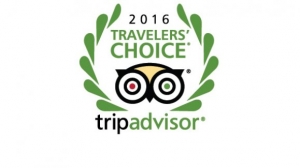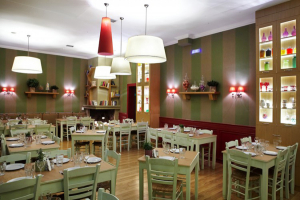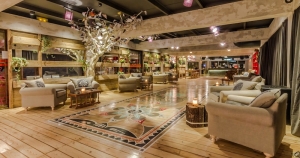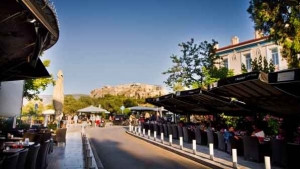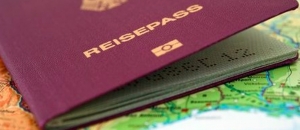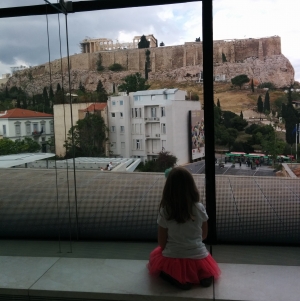LIFE & CULTURE
XpatAthens
Greek Hotels Are Named Among World's And Europe's Best In 2016 By TripAdvisor
Travelers’ Choice award winners were determined based on the millions of reviews and opinions collected in a single year from TripAdvisor travelers worldwide. Now in its 14th year, the Travelers’ Choice awards have recognized more than 7,000 properties around the world, with lists covering 97 countries and eight regions worldwide.
Top Breakfast & Brunch Spots In Athens
New York Sandwiches

@newyorksandwiches_
New York is not only relevant when it comes to the aesthetic of this place, but also its mouthwatering dishes. Famous for its rich weekend brunch menu, New York sandwiches serves a variety of American classics, including grilled bread with miniature tomatoes and mushrooms, French toast, eggs Benedict, American pancakes, bagels with various fillings, burgers, salads, and, of course, New York cheesecake or praline pancake for dessert. If you're thirsty, try a cup of filter coffee, a glass of fresh juice, or a Bloody Mary.
Telephone: 21 0777 8475
The Handlebar
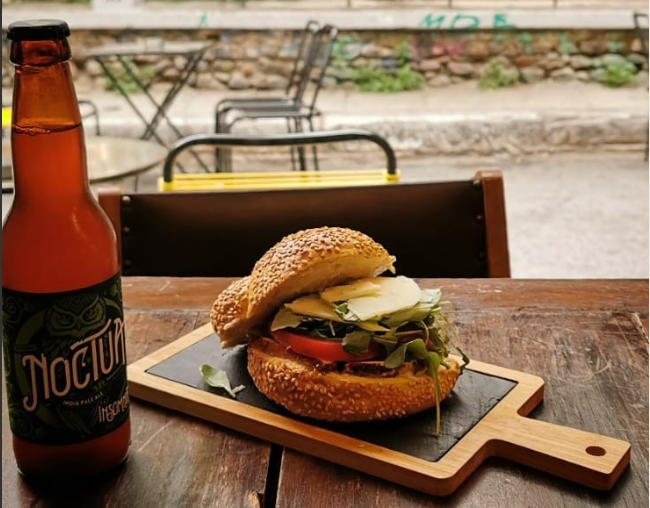
@the_handlebar_cycle_place
Telephone: 21 1409 3002
Bel Ray

@yummyaddictions_
Telephone: 21 3032 6450
Odori

@odori_vermuteria
With its nice outdoor quiet area, this place serves the best authentic Italian pizza in the city! Brunch options are plenty on the menu. Anything with eggs is fantastic, especially pizza and traditional peinirli which are both great choices for brunch!
Address: 2 Skouleniou, Athens
Telephone: 21 0331 4674

@kitchenlab_official
If you're in the mood for a beach stroll, a visit to this place is a fantastic option. The delicious dishes all have chef Akis Petretzikis' signature. Go for the eggs Benedict with turkey. Simple and tasty. Protein shakes are also a great alternative for those of you looking to maintain your fitness. The granola yogurt (for the health-conscious) and, of course, the burgers (for the more adventurous) are both delicious.
Address: 26 Lazaraki, Glyfada
Telephone: 21 0968 1126
Traditional Greek Tavernas Ideal For Children In Athens
Here are some of the top tavernas in Athens, ideal for families with young children!
O Tasos
One of the most popular family restaurants in Athens, O Tasos is famous for its ribs, a traditional Greek meat dish called 'kokoretsi', and oven cooked goat in a traditional ceramic pot. The restaurant offers excellent and fast service, an outdoor playground where children can pleasantly pass their time, and if you decide to visit the tavern on a Sunday, a clown is there to entertain the kids. The taverna also has plenty of parking so no need to worry about your car.
Hours: Open daily from 12:00
Price: 17-25 euros per person
To Steki Tou Antrea
If you wish to get away from the centre of Athens for a bit, a very wise choice would be to visit To Steki Tou Antrea in Spata. It's a family restaurant who opened their doors in 1975. The restaurant includes a wide variety of Greek dishes to choose from and guests have the opportunity to enjoy their meal while the kids may play in the playground inside the restaurant. The restaurant's ground floor is non smoking, while smoking is allowed on the upper floor.
Hours: Open Fridays & Weekends
Price: 18-28 euros per person
To Vrasto
With 40 years of presence in the field of gastronomy, Vrasto intends to bring to mind memories and smells of your childhood. The specialty of Vrasto is boiled meat soup, which is from where the restaurant received its name. Recently renovated, it has four different rooms and on sunny days, you can enjoy your meal in the green courtyard with a fountain. Other feaures of the restaurant are the child seats for toddlers, changing tables for babies, and a play area for children. Smoking is not allowed indoors.
Hours: Open daily except Mondays from 7:30 pm. Weekends open at noon.
Price: 17-24 euros per person
Koralli
Koralli is well known for the quality of their food and service, which proves the longevity of the restaurant. Koralli opened its doors in 1995, focusing on fresh seafood and ouzo. However, if you are not fond of fish, you can try one of the roasts and choose from a variety of hot and cold appetizers! The restaurant offers a lovely dining experience with its stylish interior and modern playground, where you can leave your child to be entertained while you enjoy your food!
Hours: Open daily at noon
Price: 10-16 euros per person
Gallery tou Meze
Decorated as an old mansion, Gallery tou Meze makes you feel warm and cozy as you enter the restaurant. Οne of the unique characteristics of this restaurant is its love for homemade food, including sauces, mayonnaise, sausages, and sweets. Do not hesitate to try the special dish of the day. Smoking is not allowed inside there is, however, a smoking section outside. There is live music on Saturdays and a pedestrian zone where children can play.
Originally published in Greek on: Mama365
Translated by XpatAthens
Great Spaces For Both Kids & Parents To Enjoy In Athens
If you have kids, then you must know how important it is to get them to go outside and run off some steam. Of course, it's an added bonus when you can enjoy a coffee and a snack while they play! Here are some unique places that your kids will love, but will also give you some 'parental relaxation' time. In other words, these places are great for both children and parents - enjoy!
Who doesn't enjoy the idea of having their coffee next to a fire place? At Funmily parents have the chance to start off with a hot drink and continue with delicious snacks. Meanwhile, children are busy playing indoors in areas speacially designed for them, together with the specially trained staff of the restaurant. In short, at "Funmily" you have child safety, ease and comfort while sitting at your own table.
Address: Pentelis 114, Marousi
Telephone: 210 810 5300
2. Koralli - Kallithea
Delicious dishes, fast service and affordable prices make Koralli stand out. The specialties of this traditional Greek mezedopolio are its sea food dishes, but if you or the kids are not fish lovers you can also enjoy classic dishes of Greek cuisine. The big advantage at Koralli is the indoor playground, where the kids can play for hours!
Address: Agamemnonas & Kolokotroni 19, Kallithea, 17675
Telephone: 210 941 8472
Website (in Greek)
3. Pisina - Piraeus
The famous landmark cafe and restautant called Pisina in Piraeus, is a perfect place to enjoy a coffee or sit down for lunch after a walk along the sea. On the lower level of Pisina there is a playground for younger children and electronic games for older kids.
Address: Akti Themistokleous 25, Pireaus
Telephone: 210 451 1324
Website (in Greek)
4. Balux Café - Glyfada
A great spot all year around in the south is Balux Café at the Asteras complex in Glyfada. This warm and welcoming place will make you feel like home from the moment you walk in. Whether indoors during winter or outdoors during the summer, this is an ideal spot to enjoy coffee, lunch or dinner all the while your kids release their energy in the large playground available.
Address: 58 Posidonos Av., Athens, Asteras Glyfadas Complex
Telephone: 210 898 3577
Website
5. Tritsi Environmental Awareness Park - Ilion
Coffee and outdoor exploration is the perfect combination at Tritsi Park in northern Athens. It is an ideal place to visit on a sunny Sunday morning and is great for nature lovers, both young and old. The kids can play whatever game they wish in natual surroundings and there are cafe options with light snacks and beverages for the whole family. There are often educational programs organized in the park for you and your children to enjoy together.
Athens Mayor Signs Greece's First Same Gender Civil Partnership
“As the first day that the law is being implemented, today is very important for civil rights in Greece and the country’s compliance to international reality,” the mayor said during the signing ceremony at Athens City Hall on a Monday in late January.
While Greece is one of the last European countries to legalize gay civil union, the Greek Orthodox Church still opposed the policy.
To read more, please visit: Greek Reporter
by
C.J. Polychroniou
How To Make The Perfect Cup Of Greek Coffee
To make Greek coffee, you'll need a briki, a metal (copper is best) pot with a long handle. Brikis come in many different sizes–anything between 2 and 6 cups is acceptable. However, keep in mind that if you're serving more than 6 cups at a time, you'll need to do it in stages.
1. Greek Coffee
2. A briki
3. Water
4. Sugar
5. Demitasse cups
Step1: Take however many demitasse cups are needed and fill each with water. Then, pour the water from each cup into the briki. Add 1 heaping teaspoon of Greek coffee into the briki for each demitasse cup.
Step 2: Add sugar as needed: 1 teaspoon for metrios (medium) 2 for glykos (sweet)
Step 3: Put the briki on a gas burner and turn it on to medium-low heat.
Step 4: After a few minutes when it starts to get warm, continuously stir the mixture until it dissolves. Once all is dissolved, stop stirring.Continue to slowly heat and watch for the foam to rise and take it off right before it begins to boil. (This foam is called kaïmaki) and the richer the foam, the better the coffee.
Step 5: If it’s just one cup, pour and enjoy. However, if there is more than one, pour a little into each cup, then go back to the first, and fill up each cup to the top. The reason for this is that you spread the foam to each of the cups so it will be present in each person's coffee.
Athenian Winter ~ Sunshine, Relaxation & Great Bites
And when the weather turns warm, the feet feel like wandering - getting out of the house is top of the to-do list. This week I popped out to a couple great places - neither really 'new', and neither really cheap, but worth adding to your list...
Living in Thiseio, everyone knows the old Stavlos bar. This is the historic building at the top of Herakleidon St., the (actual) horse stables of King Othon during the mid-19th century. The building has gone through various incarnations, most recently as 'Root Artspace '. That business has now been re-opened as The Sowl, and has undergone a considerable makeover the process. The beautifully restored space has been given a warm 'southwest' feel in both the decor and the menu. Think 'tex-mex' meets 'bohemian', and throw in a colourful water fountain. Almost deliberately over-the-top... They serve up delicious food, including a Mexican fusion-style menu and modern Greek selections. And there is a surprisingly interesting wine list with some nice international choices. All this means that your night out will cost you more than your local taverna - but it's 17 degrees outside after all ;)
Ths Sowl is still functioning as an art and events space, with a event room and an upstairs gallery. I actually went by on Saturday for a morning yoga class run by Lynn Roulo, and stayed afterwards for brunch with the group.
On another warm night I was invited for dinner at Cinco in Kolonaki. Cinco has been on my list to try for a long time - the Iberian/Japanese/Peruvian fusion menu is pretty unique in Athens, and I heard the vibe was very cool... I was not disappointed. Definitely interesting menu (sea bass ceviche with pomegranate-tigers milk and red quinoa…!) and a relaxed trendy vibe, in a lofty industrial space. There is a ceviche bar, there are interesting cocktails, there was retro pop playing that night - a trendy spot by any standard, and easy to imagine that you are far away from Athens... Again, this is not your neighbourhood taverna - think The Sowl and then some. A bit over-priced if I’m being honest, but not the usual Athens kitchen...
I was pleasantly surprised by the fact that they both accept credit cards, but even my neighbourhood mini-market has touchless payments these days. A topic for another time...!
Go ahead - get out and enjoy this Athenian winter... It's 17 degrees outside after all.
Until next time,
Jack
Greece To Welcome More German Holidaymakers In 2016
The report, however, also found higher figures for people who would not be influenced in their travel plans, led by Spain with 50 percent and Greece at 39 percent.
To read more, please visit: Greek Travel Pages
Travel Bloggers Greece Celebrates One Year Anniversary
Ideas On What To Do With Children In Athens
2) The Athens Zoo - Attiko Parko
Children under 3 years old do not pay and on the so called ‘Stroller Friday’, every mom or dad who will come with a baby stroller will pay the discounted price of 10 Euro. The zoo also offers various discounted packages for (large) families and special prices for seniors and disabled persons.
The children can get very close to the animals and the zoo is very stroller friendly.

